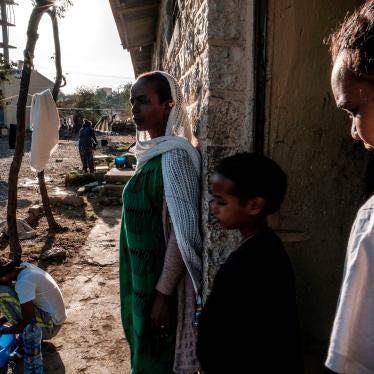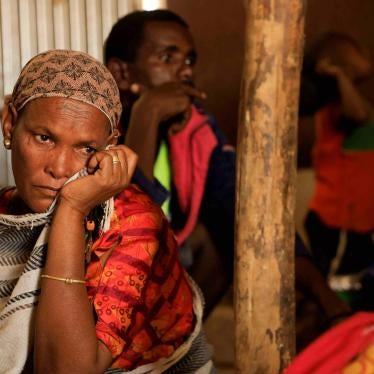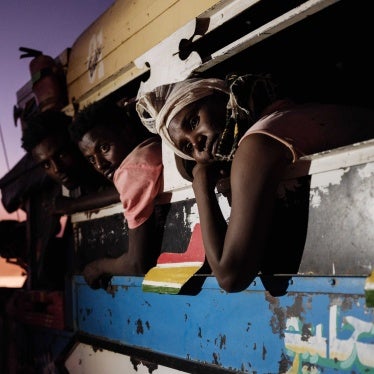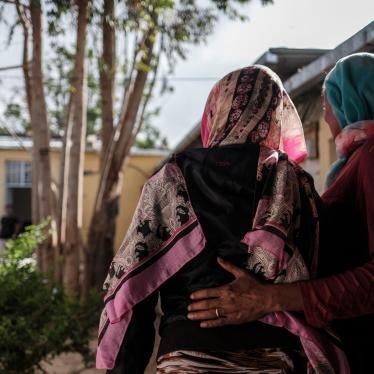Revised 26 September 2022
In December 2021, the United Nations Human Rights Council established a new mechanism to investigate allegations of violations and abuses of international human rights law, humanitarian law and refugee law in Ethiopia committed since 3 November 2020 by all parties to the conflict. The one-year mandate of the ICHREE will soon expire and must be renewed at the 51st session of the Human Rights Council.
While international attention on Ethiopia may have waned, grave violations against civilians continue both in northern Ethiopia and in other parts of the country, amid widespread impunity. Fighting also erupted in late August in northern Ethiopia renewing concerns about the impact of the fighting on civilians. The mandate of the ICHREE therefore remains critical.
Below we provide some answers to key questions regarding the work of the ICHREE and why its mandate should be renewed by the Human Rights Council, and that it should be given the time and resources it requires to implement its important mandate.
1) What is the current human rights situation in Ethiopia?
Continuing abuses in northern Ethiopia, notably Tigray
Ethnic Cleansing in Western Tigray
In April 2022, jointly with Amnesty International, Human Rights Watch released a report documenting an ethnic cleansing campaign since November 2020 against the Tigrayan civilian population in Western Tigray zone by newly appointed officials and regional security forces and militias from the Amhara region, with the acquiescence and possible participation of Ethiopian federal forces, amounting to crimes against humanity as well as war crimes.
These abuses, including extrajudicial killings, enforced disappearances, arbitrary arrests and forced expulsions of Tigrayans, had not been covered in the joint investigation by the national Ethiopian Human Rights Commission (EHRC) and the UN Office of the High Commissioner for Human Rights (OHCHR). They also continue to date. Hundreds, if not thousands, of Tigrayans remain in detention in the Western Tigray zone in life-threatening conditions that could amount to the crime against humanity of extermination. And yet oversight remains minimal, with only limited humanitarian presence on the ground and no access to detainees.
Continuing Effective Siege of Tigray
Obstruction of humanitarian assistance, the attacks and intimidation of aid workers, and lack of access to basic services has been a key feature of the conflict since November 2020. Many of those trends persist. Since June 2021, the federal government has imposed an effective siege on the Tigray region denying civilians access to basic services and to greatly needed assistance. The government’s actions and their impact were not covered in the joint OHCHR/EHRC investigation report.
Following the government’s declaration of a humanitarian truce in late March 2022, humanitarian convoys entered Tigray for the first time in months. Yet, the response, hampered by ongoing limits on fuel and cash, have not matched the scale of the needs.
Basic services largely controlled by federal authorities, notably banking, electricity, and communications, key to people’s very survival, have been shut off for over a year, causing disproportionate harm to the civilian population, hindering humanitarian operations and limiting real-time reporting. Access to basic necessities have become politicized, with Ethiopian authorities stating that sustained humanitarian access and the resumption of basic services will occur once a ceasefire agreement is concluded.
Following the resumption of hostilities on 24 August, Tigrayan forces reportedly seized fuel stored at a UN warehouse in Tigray’s capital, Mekelle and destined for humanitarian purposes, according to the UN . On 26 August, an airstrike in Mekelle killed at least four people, including two children, according to media reports. Aid into Tigray by road and air have remained suspended since. Fighting has also continued in the region, with reports of Eritrean forces taking part in offensives in the region.
Serious Abuses in Other Conflict-Affected Areas
Tigrayan forces carried out serious abuses that may amount to war crimes, including summary executions, sexual violence, and attacks on civilian structures such as healthcare facilities, in the Amhara and Afar regions after conflict spread there in July 2021. Aid agencies have since struggled to scale-up the response to meet the ongoing needs in the two regions. The resumption of fighting in late August resulted in increased displacement in Amhara and Afar regions, as well as reports of looting and property destruction.
Since the start of the conflict, throughout Ethiopia, Ethiopian authorities have also arbitrarily detained, discriminated against, and forcibly disappeared thousands of ethnic Tigrayans, including returnees from Saudi Arabia. Tigrayans also remained in detention long after the lifting of a nation-wide state of emergency in January 2022.
In the Oromia region, both federal and regional government forces have been engaged in an armed conflict with the Oromia Liberation Army (OLA) armed group since 2019, resulting in numerous abuses against the civilian population. Large-scale attacks against minority communities in western Oromia have continued, including the killing of hundreds of Amhara in June and July 2022.
2) Why does the ICHREE’s mandate need to be renewed?
While the December 2021 resolution establishing the ICHREE called for its immediate operationalization, as the chairperson explained during the June Oral update to the Council, the team was only operational as of May 2022. Ethiopian authorities refused to cooperate with the Commission, rejected its mandate and introduced resolutions at the UN General Assembly to cut its funding. As a consequence, the ICHREE was granted fewer staff members than requested to undertake the mandate.
In July, the government set forth its requirements for cooperation with the ICHREE: that the Commission not repeat the joint investigation by the national Ethiopian Human Rights Commission (EHRC) and the Office of the High Commissioner for Human Rights (OHCHR); and that the government know the modalities of its engagement. Both conditions would entail inappropriate interference in the work of an independent HRC-mandated mechanism.
Despite the time limitations and funding constraints on its mandate, the ICHREE has made good progress. However, to fulfil its mandate given by the Human Rights Council, it requires more time and adequate resources.
The severity, scope, and scale of the abuses since the beginning of the conflict have been significant, and more time will be required to conduct thorough, credible, in-depth and ethical research into these trends.
It is important to underline that independent, real-time reporting since the beginning of the conflict has been significantly hampered due to the government communications shutoff, meaning that investigations have taken time and that key abuses and incidents have not yet been uncovered and documented.
Access to conflict-affected regions for journalists and human rights investigators have been restricted within a broader context of harassment of journalists, with the Committee to Protect Journalist reporting that at least eight journalists have been detained as of August 2022.
Ensuring in-depth investigations into incidents and trends of abuses in the Amhara and Afar regions during the period that the Tigrayan forces were present and its aftermath are also critical.
3) Ethiopia is taking steps towards ensuring accountability. What added value does the ICHREE bring?
Domestic, regional and international investigations and accountability efforts are not mutually exclusive, but can be complementary. Ethiopia’s international and regional partners should look at finding ways at the country level to support credible domestic accountability processes and efforts, as well as those at the international level.
The government has taken steps towards establishing institutions tasked with investigating serious abuses and understanding the root causes of violence in Ethiopia. However, given both the scope and breadth of violations, the range of actors involved, renewed hostilities, and the participation of forces from Eritrea who have committed violations since the beginning of the conflict in northern Ethiopia, as well as a long history of impunity for serious crimes in Ethiopia, Human Rights Watch does not believe that steps taken so far or domestic accountability alone will provide sufficient justice and redress both to the victims and to ensure that justice plays a preventative role.
Concerns with domestic accountability processes – delays and lack of transparency and due process
Human Rights Watch has for several years documented concerns around domestic accountability processes for serious crimes in the country. In the last three years, despite the initiations of investigations and commissions, we have found that investigations following serious bouts of violence have been slow and marred by due process issues. Such efforts have also lacked transparency, making independent scrutiny of them impossible.
Normative gaps in Ethiopian laws
Human rights organizations, including the joint OHCHR/EHRC report found that the gross violations committed in the context of the conflict in northern Ethiopia may amount to crimes against humanity and war crimes. Normative gaps within Ethiopia’s domestic law however, including the lack of recognition or criminalization of “crimes against humanity,” in Ethiopia’s Criminal Code, mean that the crimes committed may be recognized as standalone or isolated crimes by Ethiopian domestic institutions. This would fall far short of what an investigation and prosecution of a crime against humanity requires, where the abuses may be widespread or systematic in scope and entail multiple victims.
Military court system – concerns about transparency and due process
The Ethiopian government’s reliance on the military court system to try serious violations committed by Ethiopian military forces continue to lack transparency and raise concerns about due process and justice and redress for victims and survivors of heinous crimes.
In May 2021, the Office of the Attorney General released its findings of its investigation into allegations of atrocities committed by Ethiopian and Eritrean forces in Axum. The investigation ignored the role of Ethiopian forces in extrajudicial executions and pillage of civilian infrastructure and property, as well as the horrific massacre of hundreds of civilians by Eritrean forces in the course of 24 hours.
On May 21, 2021, after public pressure, the Attorney General's office released a summary of efforts taken so far by Ethiopian authorities towards accountability. It stated that Eritrean forces killed over 100 civilians in Axum and that the military court system had brought charges against 28 Ethiopian soldiers accused of extrajudicial executions, and 25 Ethiopian soldiers accused of committing acts of sexual violence and had sentenced 4. Transparency around these trials and convictions, including the role and rank of these forces, whether any senior officers or authorities exercising command responsibility were held to account, and the areas in which the soldiers are accused or found responsible for carrying out these crimes are still unclear. The joint OHCHR/EHRC report also raised concerns that the “investigations conducted by Ethiopian national institutions do not match the scope and breadth of violations it has identified ...nor that those investigations which are being undertaken sufficiently comply with international standards, including with respect to transparency” (para. 376). The report further raised concerns that “national institutions may not be sufficiently addressing matters of command responsibility for the violations they are investigating” (para. 376).
In September, the government acknowledged that an investigative team established by the Ministry of Defence found 60 incidents of crimes involving extrajudicial killing and sexual violence that had been submitted to the military courts. As of August 2022, the military courts handed down 25 convictions and 2 acquittals. However, no information was made public on the rank of Ethiopian federal force personnel involved, locations where incidents occurred, how abuses implicating regional forces have been investigated, or clarity on access to proceedings by survivors or family members.
Lack of progress in investigations and accountability for abuses committed by Eritrean forces
Additionally, it is unclear what steps the Ethiopian government has taken to secure the cooperation of the Eritrean government to investigate and hold to account abuses committed by Eritrean forces in Axum and other parts of Tigray, including extrajudicial executions, sexual violence, and pillage.
Importantly, the joint OHCHR/EHRC report stated that it had been unable to monitor and confirm investigation efforts by the government, and raised concerns about proceedings failing to meet international standards, including around transparency. The government’s response to the joint OHCHR/EHRC report’s findings also acknowledged the conviction of seven soldiers and “undertook to publicly disclose the records of these trials,” but has not released further information to the public to date.
Inter-Ministerial Taskforce – slow progress and lack of independent oversight
In November 2021, following the release of the joint OHCHR/EHRC report, Ethiopia established the Ethiopian Inter-Ministerial Taskforce (IMTF) on Accountability and Redress to investigate violations of international human rights law and humanitarian law in the context of the conflict in Tigray, Afar, and Amhara regions.
On 21 September, the IMTF released its preliminary report on its criminal investigations into allegations of domestic and international law violations committed by warring parties in the conflict in northern Ethiopia. The report investigated thematic abuses in the Afar and Amhara region as “Track-I” of its criminal investigations and determined that Tigrayan forces have carried out war crimes and crimes against humanity.
Human Rights Watch is however concerned by the lack of independent oversight over the taskforce’s investigations, and transparency around how its investigation methodology and judicial strategies align with international standards.
The IMTF claimed it plans to investigate allegations of violations by Ethiopian federal and allied forces in Tigray, including Western Tigray in subsequent tracks, with investigations to be completed by the end of December 2022. It is not clear, however, how the IMTF plans to investigate abuses in Tigray, and how serious violations committed by Eritrean forces will be dealt with. For instance, while the IMTF report acknowledges that Western Tigray is under the control of federal and Amhara regional forces, it suggested that the “security situation in these areas remains unconducive for any serious investigation.”
It is also unclear how the IMTF and the government plans to investigate trends and incidents that were not documented by the joint OHCHR/EHRC report. The joint OHCHR/EHRC report made clear it would not identify those most responsible and issues of command responsibility, yet it also highlighted concerns with the lack of clarity as to how domestic accountability actions to date would deal with command responsibility.
Complementary role of the ICHREE
ICHREE has an important role to play given the gaps outlined in the steps taken by the government thus far, including its mandate to make recommendations on transitional justice and reconciliation, to identify those responsible, and preserve evidence and make recommendations in any future accountability process. The mechanism’s findings could also feed into domestic processes, or in the event that domestic processes fail to lead to accountability, could feed into other judicial mechanisms in the long term.
4) What timeframe should be the focus of the ICHREE’s investigation?
The ICHREE is mandated to investigate violations by all parties to the conflict since November 3, 2020. The ICHREE is an independent expert mechanism and must be allowed to determine the focus of its investigations, without interference.
The Ethiopian government wants the ICHREE to focus its investigations on the period after June 2021, on the basis that the joint OHCHR/EHRC report already covered the abuses and violations committed in the first eight months of the conflict (November 2020 – June 2021).
The ICHREE chairperson in their June briefing to the Council explicitly stated that they would “build upon the [joint OHCHR/EHRC] report in a manner that adds value and avoids unnecessary duplication of effort, without limiting the temporal or geographic scope of the Commission’s mandate.”
Human Rights Watch believes that there are still many trends and incidents that require in-depth and further investigation that were not documented either in the joint OHCHR/EHRC report, nor in reporting by the media, human rights organizations and humanitarian organizations.
The joint OHCHR/EHRC report acknowledged that it was not a comprehensive investigation into the crisis in northern Ethiopia, emphasizing that their investigators faced security, operational, and administrative challenges to carry out planned visits to parts of Tigray and consequential gaps in their findings. The report explicitly called for ongoing, further, independent investigations (paras. 354, 374).
For example, the joint OHCHR/EHRC report did not cover widely reported massacres in parts of Tigray, for instance in Maryam Dengelat, Mabhere Dego, Debre Abay, and the Tekeze bridge massacre that Human Rights Watch and Amnesty documented in our joint report. It did not investigate the killings of humanitarian workers, such as the killing of three Médecins Sans Frontières (Doctors Without Borders) staff. The report made scant mention of the some of most serious and ongoing abuses committed by the Amhara regional forces and militia against Tigrayans in Western Tigray and did not investigate the grave abuses that happened within the context of mass detentions of Tigrayans in the Zone.
Furthermore, patterns of abuses have persisted following the withdrawal of government forces from Tigray in late June 2021. Dealing with these trends in an arbitrarily defined and time-bound manner, through restricting the temporal scope of the ICHREE’s work, risks once again overlooking key trends.
For example, in Western Tigray Zone, following June 2021, new waves of abuses were meted down against the Tigrayan population there, including mass arrests and forced expulsions. These continued waves of violence cannot be disconnected from the campaign of ethnic cleansing underway there since the early weeks of the conflict.
Similarly, while the joint OHCHR/EHRC report could not confirm “deliberate or wilful denial of humanitarian assistance to the civilian population in Tigray” or the “use of starvation as a weapon of war,” it recognized the need for further investigations on alleged violations related to denial of access to humanitarian relief and killings of humanitarian workers prior to June 2021. The continuing deliberate obstruction of assistance which foreseeably created widespread harm to civilians was intricately linked to the effective siege the government has imposed on Tigray since June 2021.
It will be critical that the ICHREE can continue its important work documenting overlooked and undocumented abuses since the start of the conflict in November 2020 and which cements this mechanism’s independence and impartiality.
5) Can the ICHREE conduct an in-depth and credible investigation without full access to Ethiopia?
Despite the significant obstacles the ICHREE has faced and is facing, the Commission is still capable of carrying out credible and essential investigations and reporting without access to the conflict areas.
While the federal government met with the ICHREE team during their visit to Addis Ababa, the investigators did not get access to conflict-affected areas. The team would need full and safe access to conflict-affected areas, without government interference, to allow the ICHREE to maintain its independence in terms of scope and focus of the work.
Government denial of access to international mechanisms is often a way to avoid scrutiny. However, many mechanisms established by the Human Rights Council have designed tools to conduct their investigations without country access. Lack of access does not present an insurmountable obstacle to ensuring accurate and robust reporting on violations and abuses as has been the case, for example, with the UN Fact-Finding Mission on Myanmar.
Ethiopia’s partners should press the government to allow safe access to investigators, but lack of access should not be an obstacle to the work of the ICHREE.
Finally, there is no doubt as the Chairperson explained during the June Oral update to the Council, the ICHREE requires additional resources, given the cuts in positions initially requested.








